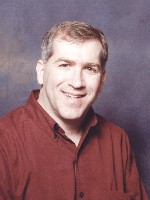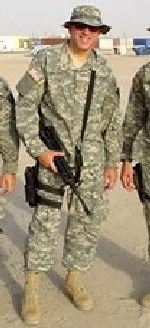News & Events
The Play Must Go On in Iraq for Westminster Theatre Professor
Posted on Wednesday, February 22, 2006
Scott Mackenzie, a United States Army Reserve Infantry Major and assistant professor of theatre at Westminster College, has made history in Iraq by producing and directing one of the first English-speaking plays since the fall of Saddam Hussein.
Opening night for "Bigfoot Stole My Wife" took place Feb. 17 in one of Hussein's former palaces that now serves as the United States Embassy in Baghdad.
In support of this accomplishment the Westminster College Board of Trustees made the following declaration at the Feb. 18 meeting:
"The Educational Policy Committee of the Board of Trustees of Westminster College wishes to commend Major Scott Andrew Mackenzie, United States Army Reserve Infantry and Assistant Professor of Theatre at Westminster, for his meritorious service to his country and the College through his efforts to stage one of the first English language theatrical productions in Iraq since the fall of Saddam Hussein. Major Mackenzie and his theatrical troupe presented a Ron Carlson collection of works titled "Bigfoot Stole My Wife" on Friday, Feb. 17, 2006 in the United States Embassy in Baghdad. We wish Major Mackenize Godspeed and 'break a leg!'" - approved by the Board on Feb. 18.
The following is Major Mackenzie's account of the challenges he faced while staging a production in a war zone:
Q: What has it been like to pull this off?
Strange. Sometimes I feel like it is just another show. When I am working with an actor or giving notes at the end of rehearsal; at others it is like nothing I have ever done. Normally, I get all wound up when actors miss rehearsals or don't learn their lines on time. Here, I have just had to accept that we have several limitations on time. Many a night, I sat waiting for an actor to come to rehearsal only to be stood up. Rather than being offended or frustrated I just had to figure that something came up.
Eventually, I had them all there for opening night, which was the first time we ran the show end to end. I even missed rehearsals because of work issues that arose without notice. The way we handled that is that I chose a good assistant director. One of us was available every night, but I don't think I had ever missed a rehearsal for a show I was directing before that (not counting getting called to active duty two weeks before "Voices of the Holocaust" opened. I had to leave that in the hands of Kauleen Cloutier. The Army doesn't make doing theatre real easy).
Despite the work, it has been gratifying. I spent a lot of days depressed because we couldn't live up to the standard that I am used to. I was afraid that people would see the show and expect more than we could deliver, but the audiences have understood our limitations and have been very appreciative that we made the effort and happy with the quality of the show. The Morale Welfare and Recreation (MWR) Chief said the production values were beyond anything they expected. I was upset that they weren't where I had hoped, but given the circumstances, I have to be pleased.
I had to lower my standards for scenery and costumes. For example, we have one piece called "The Table Cloth of Turin" in which a guy tells how he has come to discover the table cloth of the last supper. Normally, Mike Slane [Westminster theatre instructor] would design something way cooler than I could, with every spot and dab having an artistic purpose. I wound up mixing up some Gatorade and instant coffee to make something that would look like a wine stain and dabbing it onto a sheet. It works but is not as cool as what Mike would have done.
At Westminster, we usually rent costumes and Mike has a very good working relationship with a theatrical design house out of Texas. Here we bought a couple of inexpensive costumes from and Internet Halloween store. Otherwise, we used clothing that the actors already had. It has been hard to stay focused.
Q: What made you think of doing this?
Three things:1) I really did not want to be away from the theatre for a year. It may seem silly since I have been studying this stuff for most of my life, but I had this (probably irrational) fear that I would forget how to teach and direct. 2) To get to be the real me once in a while. I play the role of army major here, but I don't really feel that is me. I am an actor, director, and teacher (not necessarily in that order). At rehearsal, I get to slip into a familiar role, like an old shoe. I remember telling my wife one night after the first audition, "I feel like me again." 3) (and this may be tied up with two) I wanted to do something for the International Zone (IZ) community that would show that my civilian skills could be valuable to the military. I get a lot of odd responses from military folks, usually positive, but odd, when I say that I teach theatre.
Q: How did you recruit actors?
Intranet. This place runs on computers. The MWR people sent out a notice that we were going to try and produce a show. We had a couple of meetings about what to call the company. We finally went with "IZ Community Players." Players is a little pretentious for my taste, but it works well enough.
Having meetings was kind of strange. Because of security considerations, you can't put out time and place on a general notice. You have to just put a contact email in. This puts the onus on someone who is interested to ask. Then we could tell them exactly where and when. We had a lot of people email about interest, but never come to a meeting or the audition. Eventually, I made a list of all the people who expressed interest and announced auditions. I had planned to double cast to cover for people who might not be able to make a performance, but I only got just enough actors to cast the show.
Q: Who is your audience?
The international community that lives and works in the IZ. We have military from all over the world here; Britain, Australia, Korea, Georgia, Italy, and Denmark, just to name a few. We also have civilian representatives of most of those countries. We have state department personnel, DOD civilians, contractors from all kinds of countries. I have seen Brits, Italians and Koreans at the two performances we have already done. Of course, we have some Iraqis but by the time of the show each night, most Iraqis have gone home. A lot of international folks live in the embassy compound.
Q: How well was it attended?
The houses have been full. About 70-80 seats.
Q: How many people were involved in the production?
Around 20-25. It is hard to know exactly because some of the technical stuff like setting up the seats and the temporary stage are handled by MWR personnel. Twelve mentioned in the program. I have eight actors (five military, three civilians) and I directed. I have an assistant director, a keyboard player/sound designer and a sound and light board operator, all military.
Q: Did you act in the play? And if not, what was your contribution?
I did not act in the play. I was the director/producer. I found the script; held the auditions; worked with the MWR folks to organize the use of the technical equipment; and have them set up the stage. I thought about acting, but I couldn't see adding that along with all the stuff I have to do at work.
Q: What type of red tape did you have to go through to secure permission to do this?
Not as much as you might think. The army has a division called "Army Entertainment," which produces plays to tour to military bases overseas, though not to war zones. Once we decided the play, the royalties specialist at Army Entertainment negotiated the rights.
I had more difficulty tracking down Ron Carlson. These monologues were not originally written to be staged, just as short stories in the first person. That turned out to be a great thing though, because he was very supportive of doing the show in Baghdad. He even sent a special piece that he thought would be good to do in Baghdad. (He did not write it specifically for us, but he did send it to us in the hopes that we would use it.) It is called "What We Wanted To Do." It is an anachronistic piece in which a medieval scientist explains why his brilliant new weapon system (boiling oil) didn't quite work the way he planned, but he knows it will work if just given another chance. All he has to do is start heating the oil sooner. It is pretty funny and makes quite a statement about the military industrial complex. Ron thought the Baghdad audience would appreciate it, and so far they have.
Q: I read where actors were working seven days a week, 12-hours per day. How were you able to get them all to be there at the same time?
I touched on this a little in one of the previous questions. I didn't get all the actors together until opening night. One of the reasons that I chose this show is because it is monologues, so I only had to have one actor at a time. This gave them time to work on words at night, since for most of the rehearsal period they only had to rehearse an hour a week. Only one night a week minimized the chances of a conflict, but there were still many. All the military folks are on a seven-day-a week schedule here and the civilians work 6. A day that looks like it will be easy can easily turn into a big mess and long when some immediate task comes in late in the afternoon. The other advantage to monologues was that (except for two that tie the show together) if an actor has a conflict come up, all we have to do is cut the piece.
Q: What can you tell me about your job when you're not involved in the play?
I work for CPATT (Civilian Police Assistance Training Team). Our mission is to rebuild the Iraqi Police Service and Ministry of Interior (MOI). We help to organize the Manning, Training, Basing and Equipping of all the MOI personnel. I work at CPATT HQ as a staff officer. I help with a lot of the large scale, national level planning on future of the MOI. Since I am only a major at a large headquarters, what I mostly do is create PowerPoint presentations for briefings.
Mackenzie, who has been with Westminster College since 2001, earned his undergraduate degree from the University of Texas at Dallas, his master's from Michigan State University, and his Ph.D. from Wayne State University
Contact Mackenzie at mackensa@westminster.edu for more information.


More Stories



